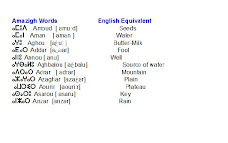
Ahwache. The Amazigh music remains one vital aspect of our culture. In 2001 I visited Tafraoute with a group of friends where we attended an Ahwache party in a small village. Ahwache is everywhere in Morocco, entitled by different names or played in different forms. In the small village where I lived, its shape was different from what I experienced in Tafraoute. Although “folklores” were composed in the same language, but in Ouarzazate Ahwache was played in a semi-circle. The women were dancing at the same time, males playing drums, and other instruments in the middle of the semi-circle. This semi-circle can be shifted to a full circle in big celebrations. The lyrics of the songs are dealing with human values like love and respect. Sometimes telling stories of the past and narrating the harshness of life











No comments:
Post a Comment